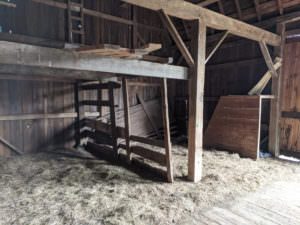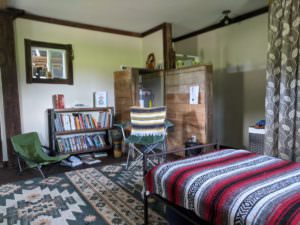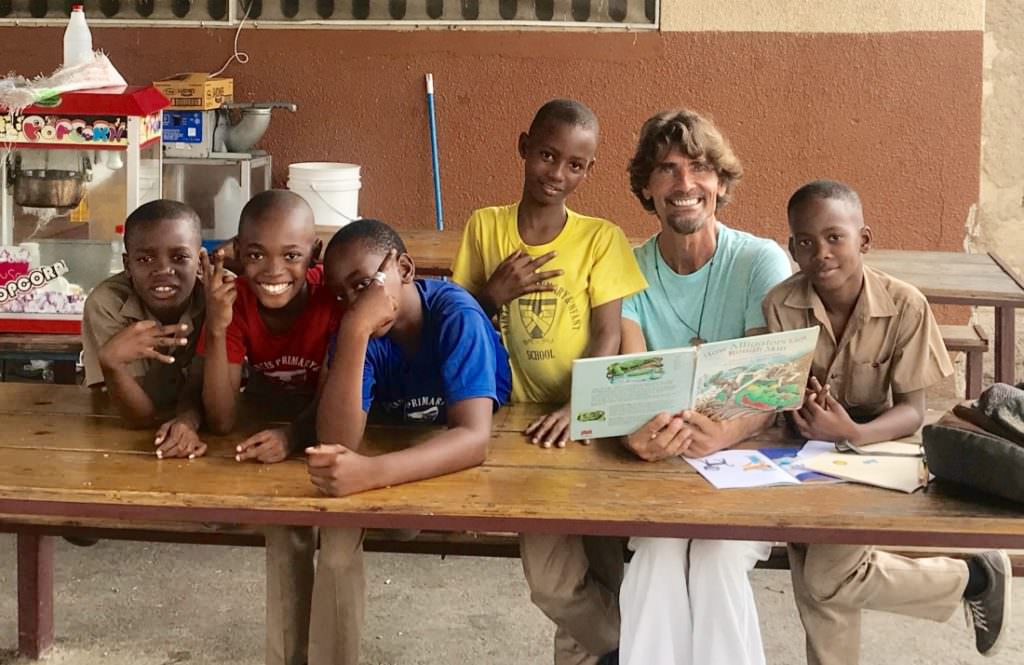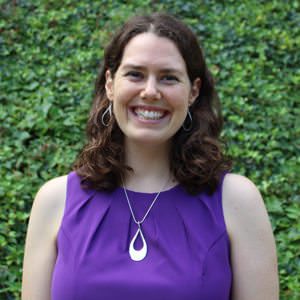FMS Lifelong Missioner Feature: Tim Shelgren
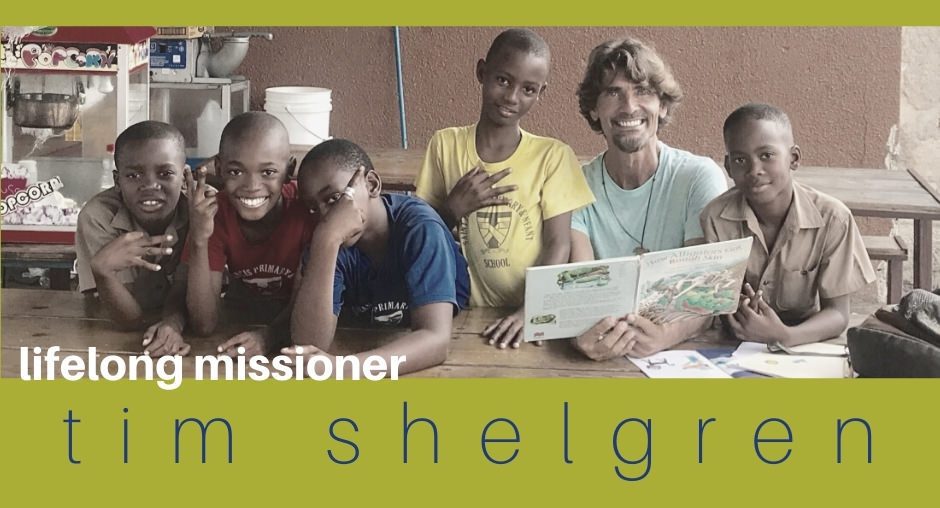
Program Director Emily Norton had the gift of interviewing Tim Shelgren (Mission Class 33, Serving from 2018-2020 in Kingston, Jamaica) via a Zoom call. Below is the interview.
Q: How have you chosen to live out Franciscan simplicity since returning to the US?
The day I left Jamaica, I remember standing in the airport on my way back to the US. I was thankful Hannah [my fellow FMS missioner] was there by my side because I was really afraid of what was ahead. I had no clue what was ahead. I did know I wasn’t interested in getting back into the American way of life because it’s so focused on individual success and the illusion of monetary security. Just because self-focus and money are the norm, doesn’t mean it’s right.
After practicing and learning to live simply with the Franciscans for two years on mission, my hope was to figure out a way to continue once I arrived back home. One of my main concerns was housing. I told my son-in-law my idea about living in his barn. There was a corner in the barn that was untouched since it required a lot of cleaning up of old boards and junk, but it was the most “feng shui” for loft-living in that particular barn. I hired a builder who was out of work due to COVID-19. He gave me a quote that I could pay off within a year. We did a lot of creative, yet no-cost, design that included repurposing the 100-year-old wood for counters, a shower stall and my composting toilet stall.
Q: What is one of your mission experiences from Kingston, Jamaica, that continues to offer lessons to you today as you serve in rural New York?
I remember going into Ms. Prussia’s 3rd grade class, and I saw the boys throwing shoes at the fan and climbing book shelves. “Where do I even start to support this teacher?” I realized that after weeks and weeks and months went by, there were relationship-related moments that were evident, so obviously helpful. It felt like it was God on a spiritual level – it felt like God was telling me that this is why you are here, “relationship.” When Christopher came to sit next to me and asked for math help, I realized he wasn’t sitting on the top shelf anymore! When I have that feeling of where do I even begin with the teens now at New Directions, I think to myself… take a breath, take your time and develop a relationship with them. It works! You can get all the college degrees you want, but all you really need is to practice relationship. Relationship can help people transform!
Q: How has the FMS mission focus of accompaniment and presence impacted the way you approach your role at New Directions?
Through ten-hour shifts, serving adolescent boys in a residential home, I regularly witness chaotic emotions and behaviors. For me, the responsibility of taking care of these boys has led me to learning to nurture the boys’ wounds caused by years of neglect and abuse.
My staff peers watch me work and they see the relationships that I form with the kids, so they respect that. The other staff are 90% authoritative and 10% relationship. I’m not a tough guy, but I have a different approach that works. I’m gentle and I’m kind, and I’ve learned to practice presence and accompaniment. I’ve learned to sit by a child’s side in silence without lecturing him… to sit in silence, to show him that I like him, even if he acts out in violence. It’s a huge difference for the boys. Eventually they receive what I have to give them [my presence] and in their own way, they ask for more.
Q: What brings you strength in moments of frustration or trial during your time with the boys?
Jamaica was harsh at times, but I had support from FMS and the sisters. But, now I am on my own. Two years isn’t very long, but it’s enough time to learn something that I can apply and stick with, regardless of resistance. You wouldn’t think there would be resistance from others when you’re accompanying those on the margins, but there is.
In Mother Theresa’s letters, she wrote about her 40 years of darkness and questioning “where is God?” I was asking that question the other day when one of the boys who has multiple personality disorder threw a chair at a peer who got hit. The dark side [of his personality] is almost demonic. I tried to restrain him, but he’s 230lbs and he smacked me across the floor. I thought to myself, “where is God in this hostility?” I used pastoral analysis to reflect on how I can help him… how to get him under control without hurting him and protecting his peers and himself. I spend a lot of time one-on-one with this boy. I take him out several times a week to the forest to walk.
My way of being with the boys is different from the other staff. I look at Francis – he was radical. And Jesus was a rebel. They weren’t doing what most people did. Instead of saying that I don’t belong here [at the group home], I look to Francis and Jesus as examples. Jesus didn’t belong. Francis didn’t belong. They made sacrifices in their comfort and their health and their happiness. If I make these sacrifices, I have learned that things will unfold, and there will be relief, healing for everyone involved, and hidden blessings.
Q: How are you continuing to deepen your Franciscan spirituality since returning to the United States?
My anxiety can be high with this work, so I have to look for ways to release the tension. My connection with the earth and sky is the thing that’s working. In Jamaica, the sky was the only thing that was familiar to me. I felt that God was with me at night when I looked up.
Now at home in Upstate New York the earth, the seasons, and the sky are incredibly beautiful. I see God everywhere as I mindfully take walks and simply look around. I have also been reaching out to the Seneca Nation, a group also marginalized and almost forgotten.
Just like Francis, the Native Americans are connected to the sun, moon, stars, earth, directions… Their reservation is near my home. Over the past couple of months, I have been invited to two Native American sweat lodges. I am learning about Native spirituality and exactly how they connect to the earth, our ancestors, and the directions. I am learning from Francis and the Natives that God is in all things living.
Q: Do you have any guidance for fellow lifelong missioners, who may be struggling with how to integrate lessons from their time on mission abroad into their daily lives as they live out mission in new circumstances back here in the United States?
In the beginning, mission at home is easy because it’s like muscle memory, and it’s in your mind. Four weeks after returning, I was still saying, “In Jamaica, we used to…” I eventually had to stop saying that. But, I didn’t stop thinking it. As the months went by, I could feel it beginning to leave my muscle memory because the pull to fall back into the American norm is so strong. Swimming upstream just gets harder and harder and all of a sudden you just want to go with the stream, with the flow.
I continually remind myself, though, that I spent a significant amount of my energy, time, thoughts, and emotions on my mission experience and I’m not going to just brush it off. Regardless of what others here are doing, I am not going to buckle. My will power is strong because I didn’t learn these lessons from a book, I learned by living it. I give my experience validity; I know what I experienced was given to me for a reason. I’ve developed a conscious awareness of living out mission all the time.
Q: Do you have any hopes for FMS in the future?
My hope is, even though the world seems to be shutting down, that the opportunities in the corners of the earth would open up for FMS. My hope is that future missioners would be strong in their search of their answer to the question, “What am I doing here?”
There isn’t always going to be obvious, quick-coming discoveries on mission. There will be, however, little tiny things, wonderful little revelations, that missioners will notice as time passes. Tiny treasures that reflect the fact that God is in them. Treasures that keep them inspired and curious, even during the most challenging, hard times.
I hope FMS can be strong and resilient amidst the resistance that it faces. May FMS’ revelations and treasures bring opportunities, motivation, and ongoing curiosity and restoration for both the individual missioner and the administrative organization at home.
Q: What guidance would you offer prospective missioners discerning to serve with FMS?
Mission, the chance to live and serve with others in another culture—simply by showing up every day and being present—the experience is truly life-changing. Mission overseas changes your being and existence. It’s a learning experience you’re not going to get even from eight years of college. You are going to get two years of education on mission that doesn’t include books. There’s such value, growth and accelerated learning! I pray that you let your presence be your present to others, and let your unique, God-infused light and peace radiate.
Tagged in:

